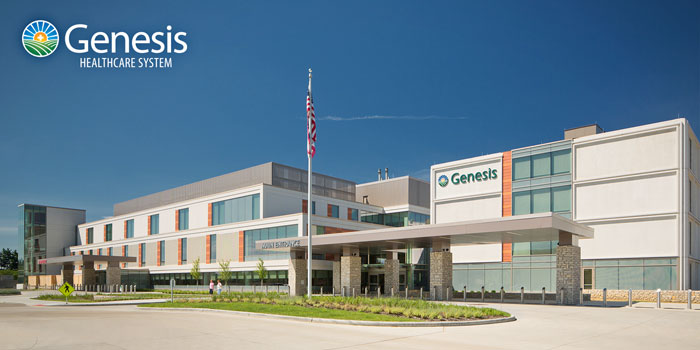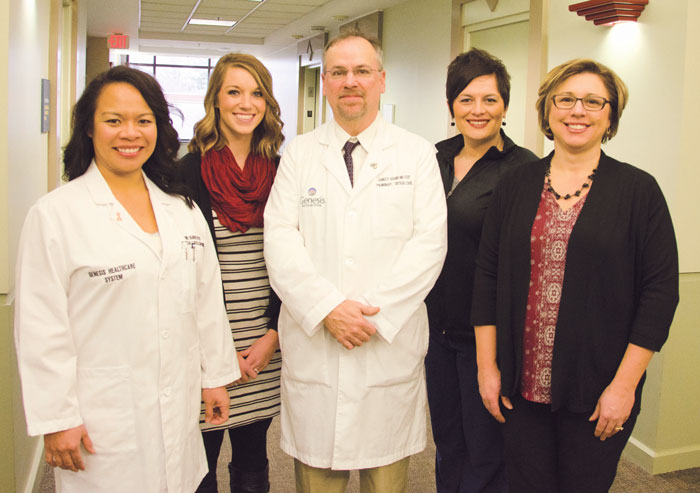COPD Readmission Prevention Program
- Need: Organized focus on COPD patients' medical needs to decrease hospital readmissions in a rural Ohio healthcare system.
- Intervention: Creation of an integrated system model with nurse navigators central to evidence-based chronic disease care management approaches to COPD care.
- Results: Since its creation in 2014, the model continues to mature its comprehensive approach to provide optimized acute and chronic care for the area's COPD patients.
Description
In 2013-14, with an eye on the Centers for Medicare and Medicaid Services' Hospital Readmissions Reduction Program expansion to include chronic obstructive pulmonary disease (COPD), Genesis HealthCare System, Zanesville, Ohio, began a COPD Readmission Prevention Program, a program was conceptualized by organization administrators. A decade later, the program is still in place, impacting both inpatient and outpatient care of the system's COPD patients.
Using several evidence-based approaches, including care coordination, the program's original focus leveraged regular reassessments within the system's continuum, starting with inpatient nursing and respiratory therapy staff paired with the program's two registered nurse navigators with critical care experience and Tobacco Treatment Specialists (TTS) certification.
Currently, the program's approach is even more comprehensive. Now existing as part of a streamlined system-wide care management model, the program's team coordinates with all inpatient and outpatient care managers. Core to this work is leveraging a centralized software program that links coordinated care specifics — including transportation needs — and serves as a resource repository that allows the system's care managers to share challenges and review solutions on a monthly basis.
When Genesis originally engaged in
Medicare Bundled Payments for several chronic health
conditions that included COPD and lower respiratory
diseases, the program was visualized as likely to be
financially sustainable from cost savings related to
coordinated care efforts. A decade later, sustainability
is still realized as a result of this system-wide care
management model. 
Services offered
At its start, the program's overall approach addressed known areas of care coordination breakdown, including elements linked to patient handoffs, follow-up care, and ongoing care for those with chronic conditions. In its current iteration, the program's approach is even more comprehensive, existing as part of a system-wide care management model that continues to focus on coordinated handoffs across the continuum of care. Staffing elements of this model include communication and collaboration between nine disease-specific care managers — including the designated COPD care managers, inpatient care managers, and outpatient primary care practice care managers.
Current COPD-specific staffing:- Dedicated social worker
- Two registered nurse Pulmonary Care Management Consultants (formerly COPD Navigator)
On admission with a respiratory illness, patients are assigned to the dedicated social worker and pulmonary care management consultant. The inpatient social worker focuses on the non-medical elements linked to patient's condition and works in tandem with the care managers. To allow for outpatient care to be attended to by the same care manager who worked the inpatient setting during the previous week, the managers rotate on alternate weeks between inpatient and outpatient settings.
Revised and added roles to Genesis's expanded care coordination model include:
- Bedside scheduling capability that allows patients/family members to coordinate best time for outpatient appointments
- Care coordination that includes working with local public transportation
- Lean Six Sigma team approach:
- As one of the nine disease-specific care managers, challenges and potential solutions identified by this team are shared with the system's care managers, physicians, and senior hospital leadership during the healthcare system's monthly Care Coordination Council's meetings
- Pulmonary Rehabilitation Services with a mid-August 2025 enrollment of 20 patients
Additional relationships contributing to the program's initial and continued success are specific collaborations with:
-
Muskingum Valley Health Centers (MVHC)
- Streamlined follow-up scheduling with these Federally Qualified Health Centers has minimized service duplication and maximized outpatient acute visit access, all helping to decrease patients need for emergency room care.
-
Mobile Health program:
- Beginning August 2021, this service brings care to patients with COPD and other patients, proving especially valuable to patients with mobility limitations
-
Palliative Care (PC) Specialists
- Since COPD has no cure, as the disease progresses, in both the inpatient and outpatient setting, these specialists manage air hunger and other symptoms
- PC nurse practitioner home visits allow frequent assessments and care plan adjustments saving the patient and families travel time to clinic or emergency room
-
Genesis Acute Care Clinic (ACC)
- Although created in 2023 for all patients, for the COPD population in particular who experience new or increasing symptoms, ACC can provide needed IV and other acute treatments not offered in the office setting and otherwise only offered in the emergency room setting.
-
Paramedicine Program
- Starting 2024, Paramedics are now available to collaborate with disease specific care managers, — including those dedicated to pulmonary patients — as well as physician offices to provide same day home visits to patients with limited mobility. These visits provide in-home care using multidisciplinary-approved protocols. Although data to support success is currently being tabulated, to date, the goal of reduced emergency department visits avoidable admissions/readmissions seems to be proving actionable.
Results
In 2016, the program's success was highlighted by the Advisory Board Company as a Crimson Program demonstrating chronic disease management efforts that impacted hospital admissions and care utilization. In its initial six months, readmission rates decreased by 34%, saving its organization over $500,000.
Ongoing successes make the program sustainable from an administrative perspective. Additionally, the organization has been contacted by several of the state's academic medical centers and other hospitals to further understand program elements for possible replication.
- Data in 2018 demonstrated the organization's COPD readmission rate was 16.15%, down from 17.1% in 2017. These data points were favorable according to Hospital Compare's national rate of 19.6% from those years. Focusing on admissions only, a continued successful trend is noted with 2019 hospital admissions numbering 541; and 238 in 2023, a percent change of 56%.
- Additional data analysis revealed that hospital COPD admissions in 2024 were down from 238 to 127, a 47% reduction.

Contact Information
Rob Williamson RN, BSN, CRN, Pulmonary Nurse NavigatorGenesis HealthCare System
740.454.5644
RWilliamson@genesishcs.org
Topics
Care coordination
· Chronic respiratory conditions
States served
Ohio
Date added
November 29, 2017
Suggested citation: Rural Health Information Hub, 2025 . COPD Readmission Prevention Program [online]. Rural Health Information Hub. Available at: https://www.ruralhealthinfo.org/project-examples/990 [Accessed 25 February 2026]
Please contact the models and innovations contact directly for the most complete and current information about this program. Summaries of models and innovations are provided by RHIhub for your convenience. The programs described are not endorsed by RHIhub or by the Federal Office of Rural Health Policy. Each rural community should consider whether a particular project or approach is a good match for their community’s needs and capacity. While it is sometimes possible to adapt program components to match your resources, keep in mind that changes to the program design may impact results.
